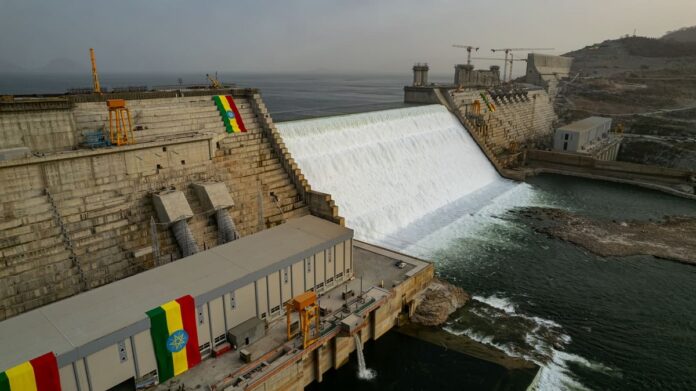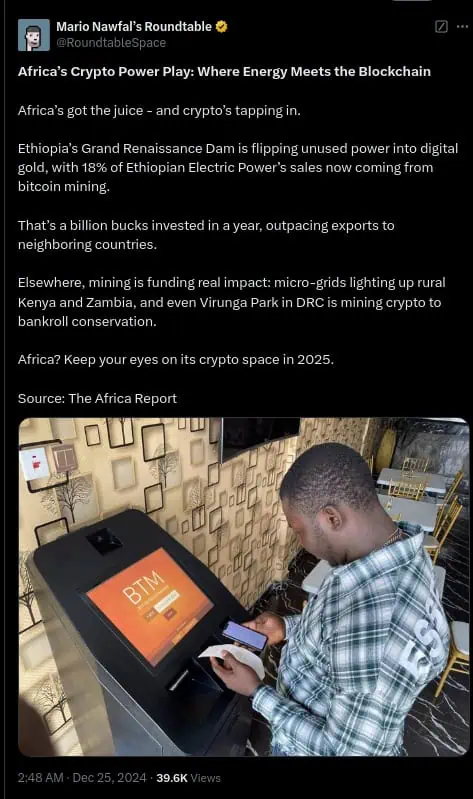
Ethiopia is turning its excess hydropower into a valuable digital asset, with the Grand Ethiopian Renaissance Dam (GERD) generating 18% of Ethiopian Electric Power (EEP) revenue through Bitcoin mining.
Africa is revolutionizing the cryptocurrency landscape, exploring one of the most innovative use cases for these technologies: the sustainable electrification of Bitcoin mining.
Ethiopia, located in East Africa, is rapidly making progress in harnessing its massive hydropower potential to become a key player in Bitcoin mining. The Grand Ethiopian Renaissance Dam (GERD), one of the largest hydroelectric dams in the world, plays a crucial role in this transformation. Thanks to the GERD, 18% of Ethiopian Electric Power (EEP) revenue already comes from Bitcoin mining, which is equivalent to more than a billion dollars invested in one year.
With this, Ethiopia has found an innovative way to use its excess energy to generate digital profits, becoming a leading example of how Bitcoin and blockchain technology can be leveraged sustainably and profitably.
Bitcoin mining becomes a growth engine for Ethiopia
The Grand Ethiopian Renaissance Dam (GERD) is a major infrastructure project that has been the subject of debate and controversy. However, its ability to generate hydroelectric power on a large scale has opened up new opportunities for the country. With an installed capacity of more than 6.000 megawatts, The GERD produces more energy than Ethiopia can consume domestically, which has led to a search for innovative ways to use this excess renewable energy.
In this sense, Bitcoin mining has emerged as A promising solution to harness excess hydroelectric energy of the country. The mining activity of the leading cryptocurrency is energy intensive, making it ideal for utilizing wasted hydroelectric power.
According to recent data published by Mario Nawfal on X, 18% of Ethiopian Electric Power (EEP) revenues already come from Bitcoin mining, which amounts to over $XNUMX billion invested in one year. This figure exceeds exports to neighboring countries, making Ethiopia a major player in the cryptocurrency market.

The economic and social impact of Bitcoin mining
The transformation of hydropower into “digital gold” is having a significant impact on the economy of Ethiopia and Africa. As Mario Nawfal highlighted, Bitcoin mining not only generates direct revenue, but is also fostering the development of infrastructure that benefits local communities and the creation of new sources of employment. Specifically, Nawfal noted that Bitcoin mining is opening up new investment and economic growth opportunities for Ethiopia and other countries in Africa, such as Kenya and Zambia, where mining microgrids, in addition to economic benefits, are lighting up rural areas.
Nawfal also mentioned that in Virunga Park, in the Democratic Republic of the Congo, Bitcoin mining is financing biodiversity conservation, demonstrating that this activity can have positive impacts beyond the economic.
Sustainability in BTC mining
In Ethiopia, the use of surplus hydroelectric power for Bitcoin mining is significantly contributing to mitigating the environmental impact of this activity.
By harnessing the clean, renewable energy generated by the Grand Ethiopian Renaissance Dam, the country is not only reducing its carbon footprint but also establishing a sustainable model for Bitcoin and other cryptocurrency mining. This strategy allows Ethiopia to position itself as a leader in the responsible use of energy resources, while fostering its economic and social development through the crypto industry.
Hydropower, ‘Digital Gold’ and economic development
The transformation of hydropower into “digital gold” in Ethiopia is a fascinating example of how Bitcoin and emerging technologies can drive economic and social development. By embracing BTC mining, the country has shown that innovation and adaptability are essential to seize the opportunities offered by the crypto industry.
But the growing adoption of cryptocurrencies in Africa is revolutionising not only the financial sector, but also the way countries use their natural resources to generate value. Ethiopia is at the forefront of this revolution, turning its abundant hydroelectric power, especially from the Grand Ethiopian Renaissance Dam, into a significant source of revenue, underlining the potential of this activity to transform the country’s economy.
In short, for experts, this approach adopted by the nation is offering valuable lessons to other nations looking to take advantage of blockchain and cryptocurrency technologies. By monetizing its energy surplus, Ethiopia has managed to boost its economic growth and establish a sustainable model that could inspire other countries on their path to financial inclusion and technological and social development.
Main image from ConnexUs


